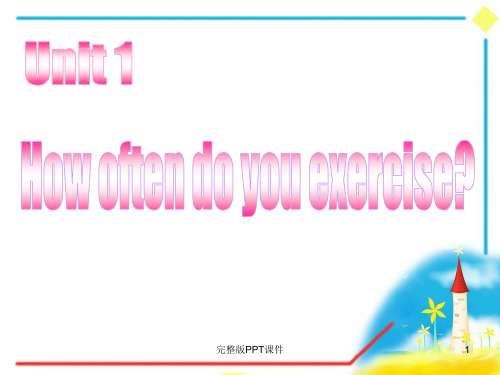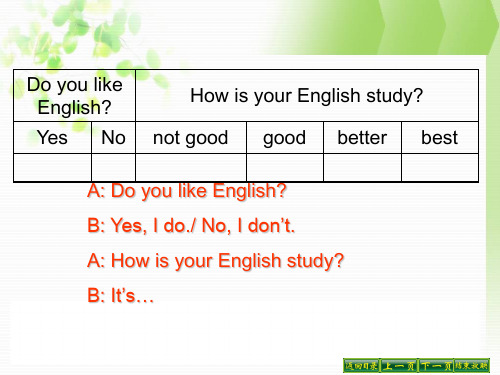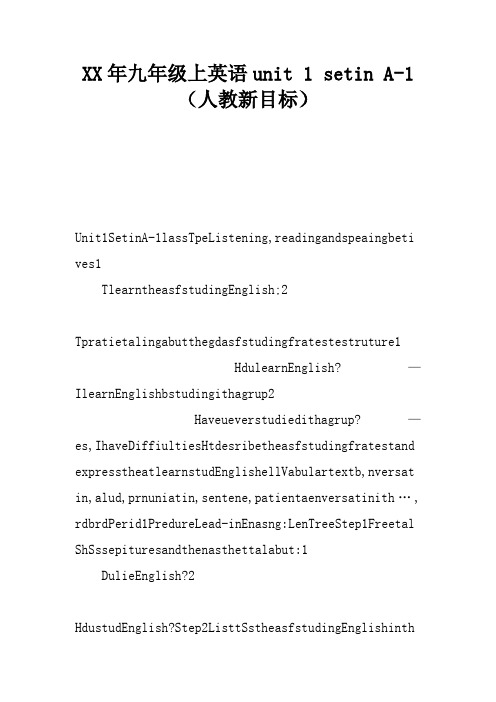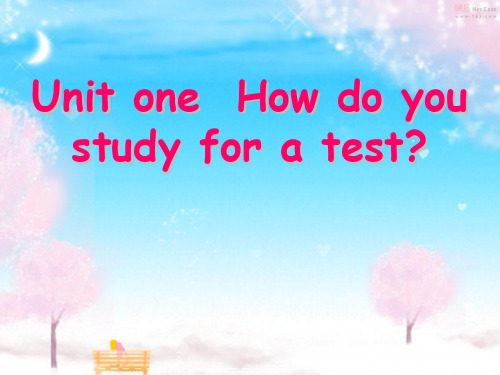2017人教版九年级英语第一单元课件
人教版九年级英语unit 1 Section Bppt课件

K: Yeah, I love it, too. I guess I eat it two or three times a week.
R: And coffee? How often do you drink
coffee?
完整版PPT课件
24
Tapescript
B: Oh, I drink coffee four times a day. I love coffee.
R: OK, then, so, um, how often do you
exercise?
K: Every day.
B: Hardly ever.
R: Uh-huh. How often do you eat
vegetables and fruit?
完整版PPT课件
22
Tapescript
K: I eat vegetables every day and I eat fruit every day.
完整版PPT课件
12
milk
Cola
orange juice 完整版PPT课件
tea
13
junk food
cola
完整版PPT课件
14
Is the food in the following pictures healthy or unhealthy?
完整版PPT课件
15
unhealthy food
B: I sometimes eat vegetables.But I never eat fruit. I don’t like it.
R: All right. So how many hours do you sleep every night?
人教版九年级英语unit1sectionA课件共27页文档

hear.
play
1.__√___ Do you learn English by watching
English-language videos?
2. _√____ Do you ever practice conversations
with friends?
3. _____ What about listening to tapes?
day.
Girl 3: Have you ever _st_u_d_ie_d_ with a group?
Girl 2: Yes, I have! I’ve learned a lot that way.
4. _√___What about reading aloud to
practice pronunciation?
5. _√___ Have you ever studied with a
group?
a. Yes, I have. I’ve b. learned a lot that c. way. d. b. Oh, yes. It e. improves my f. speaking skills. g. c. I do that
going to talk about the best __w_a_y_s_ to learn
English. Who has an __i_d_e_a__?
Boy 1: Do you learn English by __w_a_tc_h_i_n_g_ English language videos?
4. __√___ What about reading aloud to practice
pronunciation?
人教版九年级英语全一册Unit1全单元课件_How_can_we_become_good_learnersppt课件

everything the charact人ers物said, their body language肢a体nd语t言he expressions
1a Check (✔) the ways you study English. Then add other ways you
sometimes study.
by 介词,凭借;依靠
a. by working with friends
b. by making word cards
通过制作单词卡片
c. by reading the textbook 通过读课本或教材
A: Have you ever studied with a group? B: Yes, I have. I’ve learned a lot that way.
2d
1.Why is Jack a little nervous ? 2. What advice does Annie give to Jack about how to read quickly ?
finish doing sth.完成或结束做某事
Jack: Annie, I’m a little nervous. I have to finish reading a book and give a report Annie: That doesn’t sound too bad. Jack: But I’m a very slow reader. Annie: For the first time, just read quickly to get the main ide理as解. D大on意’t read
2017年九年级上英语unit 1 section A-1(人教新目标)

人教版九年级英语第一单元课件

A: How do you study English? B: I study by doing … C: Do you … / What about …? Have you ever …? D: Yes … No …
I’ve learned a lot that way. It improves my speaking skills. I think it helps. It’s useful / helpful / effective.
Mei Pierre Antonio By ______________________ By ________________________ By ________________________
Pair Work: (1c)
How do you study for a test? I study by doing …
by listening to the teacher in class. by taking English classes
by communicating with foreigners
by surfing the Internet
by reading in the library
by joining a club
Unit one How do you study for a test?
Section A
Lead in
How do you study English? I study English by …
by working with friends
by making flashcards
by reading textbooks
• Look at the pictures and talk about the ways to learn English.
人教英语九年级unit 1 讲义(共58张PPT)

look up 查阅,抬头看
so…that… 如此…以至于…
too…to… 太…而不能…
[prəˌnʌnsiˈeɪʃn] n. 发音,读音
Then one day I watched an English movie called Toy Story. I fell in love with this exciting and funny movie! So I began to watch other English movies, too. Although I could not understand everything the characters said, their body language and the expressions on their face helped me to get the meaning.
That sounds difficult!
[ˈpeɪʃnt] adj. 有耐心的/n. 病人
be patient with sb 对某人有耐心
the+比较级, the+比较级 越…越…
be patient of sth 容忍某事
Well, be patient. It takes
time. You can become better
finish doing sth. 完成做某事
give a report 作报告
人教版九年级英语第一单元课件
Language points in the text
Vocabulary and Grammar
Highlight important vocabulary and complex grammatical structures, providing explanations and examples.
02
Vocabulary learning
Vocabulary classification
01
Basic vocabulary
words that are common and useful in daily communication,
such as "hello", "goodbye", "happy", "sad".
Vocabulary and grammar exercises
Vocabulary Exercises Word matching: Matching words with their meanings or synonyms.
Vocabulary memory skills
Mnemonics
Spaced repetition
using mnemonics or memory aids to help recall words or their meanings, such as creating acronyms or rhymes.
01
Unit Overview
Unit objectives
Language Skills
To improve students' reading, writing, speaking, and listening skills.
人教版九年级全册英语课件:Unit 1 Section B
佳作示范
How to learn English well English is important and useful to us. How can we learn English well? There are three good ways to help you. First, I think you should listen to English tapes every day. It is also a good idea to watch English movies and sing English songs because they can improve your pronunciation.
谢谢观赏
You made my day!
内容提示: good habits/ways, listen carefully, take notes, finish homework, study with a group, help each other, read more books, study hard, do sports, keep healthy...
• 1、书籍是朋友,虽然没有热情,但是非常忠实。2022年4月23日星期六下午7时41分48秒19:41:4822.4.23 • 2、科学的灵感,决不是坐等可以等来的。如果说,科学上的发现有什么偶然的机遇的话,那么这种‘偶然的机遇’只能给那些学有素养的人,
给那些善于独立思考的人,给那些具有锲而不舍的人。2022年4月下午7时41分22.4.2319:41April 23, 2022 • 3、书籍—通过心灵观察世界的窗口.住宅里没有书,犹如房间里没有窗户。2022年4月23日星期六7时41分48秒19:41:4823 April 2022
- 1、下载文档前请自行甄别文档内容的完整性,平台不提供额外的编辑、内容补充、找答案等附加服务。
- 2、"仅部分预览"的文档,不可在线预览部分如存在完整性等问题,可反馈申请退款(可完整预览的文档不适用该条件!)。
- 3、如文档侵犯您的权益,请联系客服反馈,我们会尽快为您处理(人工客服工作时间:9:00-18:30)。
2017人教版九年级英语第一单元课件 人教版九年级英语第一单元重难点归类 ................................................ 2 人教版英语九年级第一单元课文翻译 .................................................... 7 人教版英语九年级第一单元测试题及答案 ............................................ 9 人教版九年级英语第一单元重难点归类 【知识教授区】 一、本单元能力目标 1. 学会运用by+doing结构回答学习英语的方法。 2. 学会运用语言目标来进行听说的训练。 3. 训练学生的阅读及写作能力。 二、本单元知识点 1. by + doing 【讲解】意为“通过……方式”。 【举例】— We learn by studying with a group . 我们通过小组活动来学习。 【巩固】by 常见的意思还有:“在…旁”、“靠近”、“在…期间”、“用、” “经过”、“乘车”等。 【举例】—I live by the river. — I have to go back by ten o’clock. —The student went to park by bus. 2. aloud 【辨析】aloud , loud 和 loudly 都可以表示“大声地”,但在用法上有区别。 aloud , loud 副词。意思是“大声地,响亮”,有时可以通用。但aloud与read,call连用时,表示“出声”,而loud用于talk,speak,shout,laugh等动词之后,在口语中代替loudly ① aloud 强调发出的声音能被听见,意思为“出声地或大声地”,常用 read ,call 等动词连用。 【举例】— Please read the text aloud. 请朗读一下课文。 ② loud 意思为“响亮地,大声或高声地”,侧重发出的音量大,传得远,一般多用来修饰 speak ,talk,laugh 等动词。 loud 还可用作形容词。—Please say it in a loud voice . 【举例】—Speak louder, please, or no one will hear you. 请大声些,否则没人能听见。 ③ loudly 意为“响亮地”,其基本意义与 loud 相同,还常与 ring , knock 等动词连用。loudly 放在动词前后均可,含有“喧闹”或“嘈杂”的意味。 【举例】—Suddenly the bell on the wall rang loudly. 突然,墙上的铃大声地响起来。 3. Why don’t you join… ? 【巩固】有关提建议的句子: ① What/ how about +doing sth.? —What/ How about going shopping? ② Why don’t you + do sth.? —Why don’t you go shopping? ③ Why not + do sth. ? —Why not go shopping? ④ Let’s + do sth. — Let’s go shopping ⑤ Shall we/ I + do sth.? —Shall we/ I go shopping? 4. frustrate 【讲解】意为“使失望;使沮丧;使不成功”。 【举例】—The terrible weather frustrated all the hopes of going out .恶劣的天气破环了我们出行的愿望。 【辨析】frustrating ; frustrated 这两个词都是由frustrate 转化而来,frustrating 用来描述“某事”,而frustrated 用来描述“某人”。 【举例】— As a nurse, she got frustrated . 她当护士很不顺心。 — I find it frustrating to lose the match .我发现输掉那场比赛很是沮丧。 5. spoken 【讲解】spoken English 和 oral English 意为“口头英语”;written Enlish 意为“书面英语”。你知道“说英语的国家”怎么翻译吗?____________________ . 6. mistake 【讲解】动词。① 意为“弄错,误解”。 【举例】—You mistookwhat I said . 你误会了我的意思。 —I mistook the number and went to the wrong room. 我记错号码,走错了房间。 ② 把…误认为 【举例】— He mistook me for my twin sister .他把我错弄成我双胞胎姐姐 。 【讲解】名词。意为“错误,过失,误会”。 【举例】—Tom didn’t make a single spelling mistake in his composition. 汤姆在这篇作文里一个字也没拼错。 【常见短语】by mistake错误地;mistake sb for sb把…误以为...;make a mistake (mistakes)犯错误 。 7.realize 【讲解】动词。意为“领悟,了解,认识到”。常见的句型搭配有:realize that 从句或wh-从句。 【举例】—I realized what he meant. 我明白了他的意思。 —Does he realize his mistake yet? 他意识到他的错误了吗? 【辨析】know;realize ;see ;understand 。 ① know 是最常用,最普通的“知道”或“认识”,也可指懂得知识。 【举例】— I’ve known her for twenty years . 我认识她已有20年了。 — I know a little Japanese. 我懂一点日语。 ② realize 更强调“认识到,认识以前没注意的事物”。 【举例】— Tim didn’t realize his mistake until the next day . 蒂姆到第二天才知道他的错误。 ③ see 意为“明白,懂得,发现,看出”。常指抽象的知识,话语。 【举例】— Do you see what I mean ? 你明白我的意思吗? ④ understand 强调“理解,懂得”。多指知识,感情,情况。 【举例】—Can you understand each other. 你们互相理解吗? 8. later on 【讲解】为副词短语,意为“以后,随后”,常用来表示时间顺序的列举。常与“首先 first of all,第二步secondly ,然后later on(and then),接下来 next ,最后finally”等呼应使用。 【举例】—I can’t eat all of this , I’ll finish it later on . 我吃不下这些,呆会儿再吃。 9. afraid 【讲解】形容词,意为“害怕的,怕的”。 常见的句型搭配有:① be afraid of doing. ② be afraid to do sth . ③ be afraid that 从句 . 【举例】— She was afraid that she might lose her job. 她担心会丢掉工作。 — It seems that she is afraid to tell them about it.似乎她怕将此事告诉他们。 — Don’t be afraid of snakes. 别怕蛇。 【讲解】(用于提出异议,告诉不好的消息等场合,使语气婉转)恐怕,遗憾。 【举例】—I’m afraid your wife had an accident. 很遗憾,你妻子出事了。 —I’m afraid I can't help you. 对不起,我不能帮你。 10. complete 【讲解】形容词,意为“完整的;全部的”。 【举例】— I’ve got a complete set of the new stamps. 我弄到一整套新邮票。 —Is this a complete list? 这是份完整的清单吗? 【拓展】①只作表语,意为“完成的;结束的”。 【举例】—We can’t go out until our homework is complete. 我们把作业做完才能出去。 ② 及物动词,意为“使齐全;使完整”。 【举例】—Complete the sentences in the exercise by filling in the blanks. 在空白处填充使练习中各句成为完整句。 11. take notes 【讲解】动词短语,意为“记笔记” 【举例】—Students should take notes in class. 学生在课堂上应该记笔记。 【辨析】note ; message ; notice ① note意为“笔记,记录”;“注释”;“便条”;“纸币”。 【举例】—He never took notes in class. 他上课从不记笔记。 —Tom opened the note from his cousin. 汤姆打开了表兄写给他的便条。 —He sent me four fifty-dollar notes. 他寄给我四张五十圆面额的钞票。 ② message意为“口信,信息;消息,音信,电文”。 【举例】—Would you like to leave a message for her? 你要留话给她吗? ③ notice意为“公告,通知,贴示”。 【举例】— I’ll put up a notice about the meeting on the wall . 我将贴一个开会的通知在墙上。 12. look up 与 look through 【辨析】① look up为动词短语,意为“(强调在书本,报刊,字典中)查找”。 【举例】—If you don’t know a word, you can look it up in a dictionary. 如果你有不识的字,可以查字典。 ② look through动词短语,意为“浏览,温习”。还有“透过……看”的意思。 【举例】— My father looks through the morning paper every day . 爸爸每天都浏览早报。 —Some boys like looking through the windows while they are having class . 一些男孩在上课是喜欢看窗外。 【常见短语】look 的常见短语 look at看望,注视;look back回顾,回头看;look out留神,注意;look like看起来像;look up查寻(强调在书本,报刊,字典中查找),抬头看;look for寻找;look after照顾 ;look out of从……朝外看 ;look over检查,查看,调查;look the same看起来一样;look through仔细查看,浏览,温习;look on…as…把……当作……看待 ;take/have a look at看一看;look around/round四下查看 ; look ab. up and down仔细打量某人;look after = take care of照顾 照看 ; look forward to sth /doing sth 盼望,期待;预期。 13. do with 与 deal with 【辨析】这两个短语都有“应付……;处理……”的意思。但它们的用法不同:deal with 中的deal是不及物动词,气候不需要跟宾语,而do with 中的do 是及物动词,其后需要跟名词或代词做宾语。 do with 常与连接代词 what 连用;而 deal with 常与连接副词 how 连用。 【练一练】— I don’t know ________ this difficult problem. A. how to do with B. what to deal with C. how to deal with D. what can I do with 14. unless
